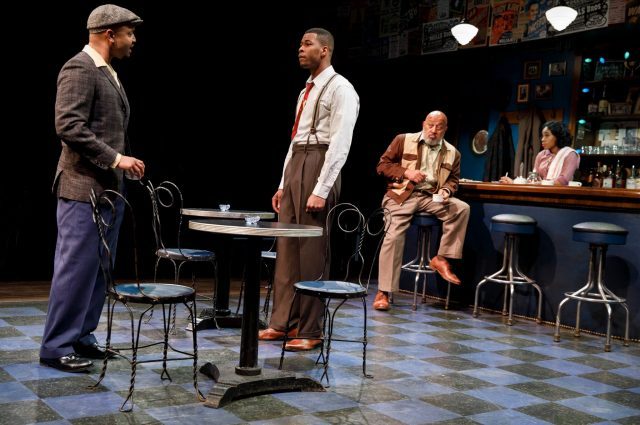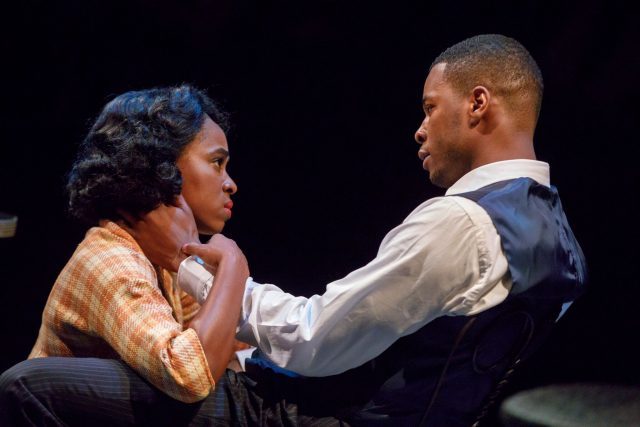
P-Sam (Francois Battiste) has some harsh words for Blue (J. Alphonse Nicholson) as Corn (Keith Randolph Smith) and Pumpkin (Kristolyn Lloyd) look on in Dominique Morisseau’s Paradise Blue (photo by Joan Marcus)
The Pershing Square Signature Center
The Romulus Linney Courtyard Theatre
480 West 42nd St. between Tenth & Eleventh Aves.
Extended through June 10, $30 through June 3, $65 after
212-244-7529
www.signaturetheatre.org
Paradise Blue, which opened tonight at the Romulus Linney Courtyard Theatre at the Pershing Square Signature Center, celebrates and extends the great tradition of exceptional sociopolitical American plays established by August Wilson. In 2013, actress, poet, and playwright Dominique Morisseau began “The Detroit Projects,” a three-play series centered on her Michigan hometown, inspired by Wilson’s “Century Cycle,” ten works set in each decade of the twentieth century in his native Pittsburgh. Paradise Blue, which comes after 2013’s Detroit ’67 and before 2016’s Skeleton Crew, takes place in the primarily black neighborhood of Black Bottom in Paradise Valley in 1949, on the eve of an urban renewal push. (Coincidentally, Wilson’s second Pittsburgh play was Ma Rainey’s Black Bottom.) The tortured Blue (J. Alphonse Nicholson) is a trumpet player who owns the Paradise Club, following in the footsteps of his father. He has just fired the bassist, leaving his bandmates, ornery drummer P-Sam (Francois Battiste) and thoughtful, considerate pianist Corn (Keith Randolph Smith), in the lurch as he prepares a solo that is proving difficult for him and arranging for the sweet and innocent Pumpkin (Kristolyn Lloyd), his lover who works at the club, to sing a number in public for the first time.
Amid rumors that Blue is going to sell the club as part of Detroit mayor Albert Cobo’s gentrification plan for Black Bottom — “Ain’t nobody pullin’ no more favors outta me. I been pullin’ favors up to my ears and I’m goin’ tone deaf,” Blue explains — the mysterious Silver (Simone Missick) struts in, renting a room at the Paradise for an extended period of time, paying cash up front. “If it’s somewhere that Colored folks is doing more than sharecroppin’ and reapin’ White folks’ harvest . . . I ought to be there,” she says. Silver is the opposite of Pumpkin, wearing silky, revealing black clothing, instantly commanding the attention of every man in any room she enters. “Spiderwoman. That’s what they call her,” P-Sam says. “She go walkin’ like that. . . . some kinda sexy spider . . . lurin’ fellas into her web. And then just when you get close to her . . . she stick into you and lay her poison.” As the night of the show approaches, P-Sam questions Blue’s loyalties, Corn and Pumpkin are both getting close to Silver, and Blue has to face some deep, dark demons.

Blue (J. Alphonse Nicholson) takes hold of Pumpkin (Kristolyn Lloyd) in New York premiere at the Signature (photo by Joan Marcus)
Paradise Blue keeps the spirit of August Wilson alive while further confirming Morrisseau (Pipeline, Blood at the Root) as a rising star in her own right. The play is smoothly directed by Ruben Santiago-Hudson, like a bandleader orchestrating a jazz number, albeit more of a nocturne than swing or bebop. A close friend of Wilson’s, Santiago-Hudson is the co-artistic director of a New York Public Radio project that is recording all ten plays in Wilson’s American Century Cycle; he won a Tony for Best Featured Actor for his performance in Seven Guitars, earned another Tony for directing Jitney last year, and took home an Obie for directing The Piano Lesson at the Signature in 2013. (He also portrayed the writer in Wilson’s one-man show, How I Learned What I Learned, at the Signature.) Neil Patel’s two-part set features Silver’s bedroom in one corner and the interior of the nightclub on the rest of the stage; the audience sits in rising rows on the horizontal sides. Above it all is a rusty marquee that spells out the club’s name in lights. The facade separating the floor from the balcony is plastered with concert posters of icons who supposedly played the Paradise, from Muddy Waters, Billie Holiday, and Duke Ellington to Jimmie Lunceford, Howlin’ Wolf, and Louis Jordan.
Rui Rita’s sensitive lighting focuses between the two rooms as well as, occasionally, on Blue’s horn, which resides on a trumpet stand on the club stage, as if it’s his soul haunting him, while Darron L West’s fine sound design lets the music soar. Wilson regular Smith (Jitney, Fences, King Hedley II) is superb as the gentle, caring Corn; Smith has such a calming presence that watching him onstage, no matter what he’s doing, is warm and comforting. Obie winner Battiste (Head of Passes, The Good Negro) portrays the suspicious P-Sam with a fire in his belly; Lloyd (Dear Evan Hansen, Invisible Thread) is adorable as the vulnerable Pumpkin, a wide-eyed young woman in love with poetry but frightened of taking charge of her life; and Missick (Misty Knight in Luke Cage and The Defenders) is sexy and alluring as Silver, who is no mere femme fatale. However, Nicholson (Seven Guitars, Caleb Calypso and the Midnight Marauders) can only do so much as Blue (a role originated at the 2015 Williamstown Theatre Festival by Blair Underwood), who is not as fully drawn and fleshed out as the other characters, his motivations not as evident throughout the play. But that turns out to be a minor quibble in what otherwise is an exciting and captivating work that evolves with the rhythm of the blues as it explores race, class, and family legacy. Paradise Blue is the first of three Morrisseau plays that the Signature will present during her five-year residency; I’m already hungering for the next one.